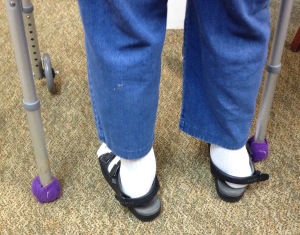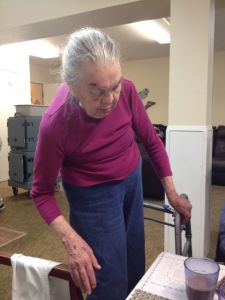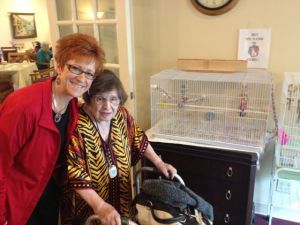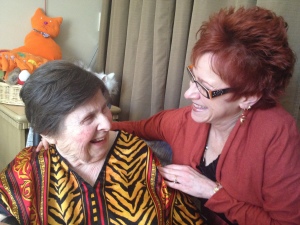
by Diane Masson | May 31, 2015

Will the POA understand new shoes are needed?
It’s hard to be an advocate for a senior for years on end. I advocated for my own mom (with vascular dementia) for over 10 years, until I recently lost her. Advocacy is not an easy job and it can entail sleepless nights of concern.
It’s vital to select a Power of Attorney (POA) who currently knows you well enough. If you can no longer speak on your own behalf, your POA needs to know if you are over medicated or sedated just by looking at you. They need to know your baseline so they can help you and reverse the issue or accelerate an outcome in a timely fashion.
The POA’s main purpose is to comply with your wishes that were indicated before you became incapacitated. They should always protect your best interests both mentally and physically.
Over medication is a growing problem for seniors. I have heard many stories of hospitals overmedicating seniors. My own mother-in-law was over sedated in the emergency room. She has Alzheimer’s. They had no room in the psych ward and she was drug restrained for three days and two nights in the emergency room. Sigh…
It has taken us four months to get my mother-in-law off Haldol. Psychotropic drugs and dementia do not mix well. Her POA thought the doctors understood what they were doing tapering off the medication. Unfortunately, my mother-in-law’s doctor admitted to knowing nothing about psychotropic drugs and was relying on others to advise her. Gulp… What a mess! We are talking about seniors’ lives…
Neither the doctor nor the POA knew what to do about my mother-in-law’s medications or where to begin. It literally required a family member taking my mother-in-law to her doctor and demanding, in person, for the Haldol to terminate immediately. The doctor could see for herself the sedation instead of relying on the input from home health professionals. The weird part was the doctor agreed to terminate the Haldol in three days. We wondered why wait three days? It turned out she wanted a psych nurse to visit my mother-in-law while she was still on the Haldol. The psych nurse agreed to terminate the Haldol too. Here is the horrible part; the psych nurse ordered a different psychotropic drug on an as needed basis. What?? It took the family helping the POA another week to reverse that fiasco.
Why are doctors prescribing psychotropic drugs to seniors with dementia in the first place?
A POA needs to be vigilant. It may require educating themselves about medications that they no nothing about. Very few POA’s are doctors and nurses. If you are the parent of a doctor or nurse who will be your POA, then congratulations are in order for you.
What about a senior with neuropathy in his or her feet? Something as simple as buying quality shoes, so a senior has better balance is key. Will the POA do it?
What if your POA is an attorney or an absentee POA relative who rarely visits, how can they understand or advocate for your needs?
A POA needs to be willing to speak to the doctor on your behalf. Some possible POA’s are very direct (speak their mind) and others are indirect (prefer to fade into the background). Some folks are introverted and others are extroverted. Who are you asking to be your POA? Will they get the job done? This is not a position for sissies. Your POA needs to be hardcore if you are in dire need. Your POA may have to spend relentless hours pursuing a medication result that is beneficial for your needs.
What have you encountered? Who have you selected to be your POA? Do you feel good about your decision?
Don’t wait until you’re in a health care crisis like author Diane Masson’s in-laws. It has been a nightmare for her in-laws and all the adult children. Research your future choices NOW to avoid being “put” somewhere, or having decisions made for you by others. “Your Senior Housing Options” is a new resource book available on Amazon.com with a 5-star rating. It offers a step-by-step guide to the options, including staying home.
Seniors, Boomer children, spouses, family members and caregivers are desperate to learn how to truly differentiate good senior housing from mediocre at best. Diane Masson’s new book will answer these heart-wrenching issues in an easy, simple, story telling format with humorous illustrations.
Diane has worked in senior housing for 17 years and is the regional marketing director for two debt-free Continuing Care Retirement Communities in Southern CA (Freedom Village in Lake Forest and The Village in Hemet). Her first book “Senior Housing Marketing – How to Increase Your Occupancy and Stay Full,” is being utilized by senior housing professionals across the country.
For weekly tips and advice go to www.Tips2Seniors.com and learn more from author and senior housing expert Diane Twohy Masson.

by Diane Masson | May 24, 2015
 It is important that seniors make a plan while they are healthy and well OR they will find themselves in a situation where family members have to “put them someplace.” My in-laws waited for a health care crisis that you can read about HERE and the adult children were forced to “put them” in more supportive environments. The doctor told my father-in-law that he needed 24/7 assisted living care and another doctor required that my mother-in-law with Alzheimer’s move into a secured memory care simultaneously.
It is important that seniors make a plan while they are healthy and well OR they will find themselves in a situation where family members have to “put them someplace.” My in-laws waited for a health care crisis that you can read about HERE and the adult children were forced to “put them” in more supportive environments. The doctor told my father-in-law that he needed 24/7 assisted living care and another doctor required that my mother-in-law with Alzheimer’s move into a secured memory care simultaneously.
How do you find a good retirement community, assisted living, memory care or skilled nursing care? “Your Senior Housing Options,” gives tips and advice on exactly what questions a senior needs to ask in order to determine if a senior living provider is great or mediocre.
Almost every week I speak to 50 to 75 seniors about their future health care and housing options. Two months ago, I created a new presentation based on my book, “Your Senior Housing Options.” What an impact it has made. Seniors share how grateful they are for clear and concise information that they can apply immediately in making a decision for themselves. This is my passion and I want to help seniors make a wise choice.
The book articulates the costs and consequences of the various senior living options. I share the ramifications of waiting too long and how a senior can save money and stress by planning ahead.
Seniors can take away valuable tips they can utilize immediately as they begin to research and explore long-term health choices. Most seniors have no knowledge of how to select a reputable home care company or retirement community. It’s important to know states vary on requirements for caregiver training, drug screening and finger printing. Due diligence of care choices can prevent elder abuse!
Ultimately, a senior can continue to live by a river in Egypt called denial or they can make proactive decisions and create a plan for their future health care. It is scary for seniors to contemplate running out of resources in a higher level of care, but it can happen (my own mom ran out of money living in assisted living for seven years). Hopefully, seniors choose a plan that has a safety net, in case they run out of money.
Current presentations based on this new book are helping seniors make proactive decisions for their future health care needs. Hopefully, this is the beginning of a movement to educate seniors.
Diane Masson has worked in senior housing for 17 years and is the regional marketing director for two debt-free Continuing Care Retirement Communities in Southern CA (Freedom Village in Lake Forest and The Village in Hemet). Her first book “Senior Housing Marketing – How to Increase Your Occupancy and Stay Full,” is being utilized by senior housing professionals across the country. Both her first book and second book, “Your Senior Housing Options,” have a 5-star rating on Amazon.com.
For weekly tips and advice go to www.Tips2Seniors.com and learn more from author and senior housing expert Diane Twohy Masson.

by Diane Masson | May 10, 2015

Comatose in Memory Care
My mother-in-law who got over drugged in the hospital several months ago is now in her second memory care community in Seattle. The first high-end memory care community in downtown Seattle wanted to follow the doctor’s recommendations of sedation. It took me three days to get the drugs reduced by half after I saw my overmedicated mother-in-law. Then the second memory care community promised our family that they would get her off the reduced Haldol dose. We believed them and paid a hefty community fee (a one time move-in fee) Sigh…
It’s been almost two months in the second Memory care.
We had an unproductive care conference about two weeks ago. When the family talked about changing the psych drugs the conversation led to considering Amy as a candidate for hospice because she was not eating. What? It turns out one of the drugs she began in the hospital was also an appetite suppressant.
She was overmedicated in the hospital because there were no rooms in the psych ward, so my mother-in-law stayed in the emergency room for three days and two nights. Getting the picture of sedation now?
My sister-in-law is on the warpath. She is demanding changes for her mom and talking about moving her to a third place. Will it help?
The second memory care called my husband to see if they could save the move out. He simple said, “You have known that the family wanted my mom off the Haldol. How many phone calls and faxes have you made to the doctor to make that happen?” The administrator started to back pedal.
My sister-in-law took my mother-in-law to her doctor yesterday. A 15-minute appointment turned into nearly hours. The doctor is going to take her off the Haldol but does not have a clue what medications will help or are necessary. My mother-in-law has significant dementia, and seemed to have had a psychotic break when she lost her home of 50 years and her husband within a week.
Why is it so hard to unsedate a senior who cannot speak on his or her own behalf? Is it easier for the memory care staff if the residents are half sedated? Can anyone help us on how to turn this around? Any tips on psychotropic drugs? Which ones are best?
Don’t wait until you’re in a health care crisis like author Diane Masson’s in-laws. It has been a nightmare for her in-laws and all the adult children. Learn how to plan ahead like Masson’s mom. Research your future choices NOW to avoid being “put” somewhere, or having decisions made for you by others. “Your Senior Housing Options” is a new resource book available on Amazon.com with a 5-star rating. It offers a step-by-step guide to the options, including staying home.
Seniors, Boomer children, spouses, family members and caregivers are desperate to learn how to truly differentiate good senior housing from mediocre at best. Diane Masson’s new book will answer these heart-wrenching issues in an easy, simple, story telling format with humorous illustrations.
Diane has worked in senior housing for 17 years and is the regional marketing director for two debt-free Continuing Care Retirement Communities in Southern CA (Freedom Village in Lake Forest and The Village in Hemet). Her first book “Senior Housing Marketing – How to Increase Your Occupancy and Stay Full,” is being utilized by senior housing professionals across the country.
For weekly tips and advice go to www.Tips2Seniors.com and learn more from author and senior housing expert Diane Twohy Masson.

by Diane Masson | May 3, 2015

Mean Mom, Nice Mom and Dementia
Here is a painful subject that I am going to bring up. Hundreds of people have reached out to me in the last week since my mother passed. So many of them shared a story about their own mom passing. Some were wonderful experiences that they will treasure and others were not. Sudden deaths are very hard. Every personal death I have experienced in my life was sudden, except for my mom’s death. You can read about my mom’s passing experience HERE.
You either had a loving caring parent or you did not. This article is for those who did not.
Many vulnerable sons and daughters were abused by either their mom or dad, sometimes both. We live in world that accepts dysfunctional families now. Family abuse that was hidden in the 1950’s and 1960’s can now be accepted in the mainstream. There are resources and counseling available so abused children (who have become adults) can acknowledge the abuse and move on.
My mother was abusive to all her young children. You can read my article MEAN MOM, NICE MOM and DEMENTIA HERE.
A wonderful counselor changed my life for the better and his recommendation is explained in my article MEAN MOM, NICE MOM and DEMENTIA HERE. My mom and I enjoyed over 20 years of a good adult relationship. I forgave her. Many of you know I have advocated for my mom’s care needs for the past 10 years.
So what happens if an abused adult son or daughter still has unresolved issues at death with mom? Do they go to the funeral? Do they have a free pass not to attend?
What have you encountered?
It seems ironic now, that my new book is dedicated to my mom. Writing this blog has been therapy for me over the last three years. After sharing numerous stories about my mom, several senior living people said you should write a book to help other seniors and their families. So I did and “Your Senior Housing Options” was published recently.
I love you mother and hope your stories peppered through the book can help others learn their options and plan ahead. So many seniors fight to stay home and then a sudden crisis causes them to lose their ability to choose like my in-laws did. What person in their right mind wants to be put someplace? My in-laws have no choices now. Seniors and their families should study the options and costs now. The greatest gift my mom ever gave me was to plan ahead at age 75, so her transition to assisted living was a good one. She recently passed at age 92 in skilled nursing care.
Diane has worked in senior housing for 17 years and is the regional marketing director for two debt-free Continuing Care Retirement Communities in Southern CA (Freedom Village in Lake Forest and The Village in Hemet). Her first book “Senior Housing Marketing – How to Increase Your Occupancy and Stay Full,” is being utilized by senior housing professionals across the country.

by Diane Masson | Apr 26, 2015

My Mom and I
My mother’s blood sugar spiked to 400 on Monday and 520 on Tuesday. She was fighting a UTI and ecoli. At 92, her body tried to fight it off. The doctor said the antibiotics would either work in two days or she would go down hill fast. It was the later.
The care ambassadors and nurses at Freedom Village were amazing. I lost count after twenty-three staff came in to say good-bye and provide loving care. One care ambassador said, “I’ve known your mom for two years and she was my family.” Another said, “Everyday she would greet me in the hall and compliment what I was wearing that day.” My favorite was someone reminding me of her love of cats and how she usually had one with her or would respond to the mechanical one that meowed, purred and moved. Her face would light up with joy.
My mom lived in a higher level of care for nine years. Seven years in assisted living and almost two years in skilled nursing in Lake Forest, CA. Six years ago, a doctor made a comment that her life was not worth living because she had dementia and couldn’t remember anything. I replied, “How many of your patients said thank you and complimented you today?” The doctor sheepishly said, “Only your mom.” I said, “Then she still is fulfilling her purpose isn’t she?” The doctor backed off and gave the best care until my mom left that Seattle hospital.
Through nine years of advocacy for my mom, I have done the best I was able, making decisions with the knowledge that I have. I am not a nurse and based my advocacy on her wishes and trying to keep her comfortable.
Extraordinary Versus Comfort Care
Hospice began on Tuesday and they were a Godsend. My husband was in Seattle saying goodbye to his dad on hospice when everything happened. A nurse, a social worker and a chaplain came from hospice to support my mom and me. I learned the differences between extraordinary care and comfort care at the end. The IV’s, antibiotics and unnecessary medicine disappeared. The morphine and adavan began.
Final Burst of Energy
After the chaplain said some beautiful words, my mom had what they call a “burst of energy.” I was holding her hand when she opened her eyes half way and said, “I love you,” seven times and “thank you” twice. Then she closed her eyes and the energy was gone. I will treasure that memory.
After she choked while attempting to eat, I said no more food. A caregiver patiently helped her drink some juice even though it took 15 minutes. That was the last time I saw her drink because she could not swallow again.
The turns every two hours caused her to cry out. The repositioning was to prevent bedsores. I called hospice when the gentle turns seemed to hurt her more and they said to reduce the turns to every three hours and give the morphine 20 minutes before. The nurses and care ambassadors were outstanding. This little tip made the gentle turns easier for her.
The last day, she started to moan with every exhale. I called hospice again. The gurgling in the throat had started and it was time to start the medication that helped with that. The director of nursing arrived before hospice and we started the PRN of morphine and adavan that had been preapproved by her wonderful doctor. Hospice increased the frequency of the medications to once an hour and said she was not to be turned again. Alleluia.
The director of nursing was there every hour to administer the comfort medications. I cannot say enough about the staff of Freedom Village Health Care Center and how they supported and loved my mom and I, to the end.
My husband came back from Seattle and the room filled with music. When the chaplain arrived they sang together and it felt like a send off party. Her doctor entered about this time, gave me a hug and said, “She is going out in style. I am so happy that she is comfortable.” A priest came to give her last rites. I said and prayed everything I wanted to with my mom and have zero regrets.
After nine hours, my husband and I decided to take a dinner break. The director of nursing said she would not leave my mother until we returned. Another change happened right before we got back.
The chaplain and hospice were called. The moan on each exhale came back and I requested more morphine for her. Her doctor gave permission. Chris and I sang a couple of songs to her. The chaplain arrived. I requested scripture and the chaplain was reading from the Gospel of John when she passed. God’s presence was in the room. She was comfortable and at peace.
Today is Sunday and I would normally go and visit with my mom. I wrote this blog to help me with my own grief today.
It seems ironic now, that my new book is dedicated to my mom. Writing this blog has been therapy for me over the last three years. After sharing numerous stories about my mom, several senior living people said you should write a book to help other seniors and their families. So I did and “Your Senior Housing Options” was published recently.
I love you mother and hope your stories in the book can help others learn their options and plan ahead. So many seniors wait until a crisis and lose their ability to choose like my in-laws did. The greatest gift my mom ever gave me was to plan ahead and move into a Continuing Care Retirement Community. Over 16 years, my mom had good transitions through three levels of care.

by Diane Masson | Apr 12, 2015

Diane’s Mom Driving -Illustration from the new resource guide “Your Senior Housing Options.”
What about you? Does one of your loved ones have dementia and still drive? Dementia drivers are jeopardizing other citizens walking in crosswalks and driving.
My father-in-law was driving with a diagnosis of macular degeneration. He justified his actions by only driving in the daytime and limiting himself to a 5-mile radius to run errands and go the doctor. As his dementia progressed he got lost driving home within this radius. He chose to give up driving on his own.
A friend told me about my mother driving several years ago. They said, “I saw your mom driving today, she can’t even see over the steering wheel. She is looking through the steering wheel in order to see the road.” I was horrified. This was completely unsafe. I still vividly remember the last time I drove with my mom. She was straddling two lanes (on the same side of the road). She said, “Diane, I know this looks bad, but I know exactly what I am doing.” I was terrified. It was the beginning of her dementia.
A resident of a senior living community drove into another resident’s balcony. As he was parking the car, the senior hit the gas instead of the brake. After backing up, he made the same mistake again and rammed the balcony a second time. Afterwards, he was disoriented and could not remember how the accident happened or why he hit the gas twice. He did not give up his car keys after this incident. The resident whose balcony was destroyed requested to have the parking place right outside his apartment home, because he did not want a repeat performance.
All these senior driving circumstances have made me a better defensive driver. Many people are concerned about teenage drivers, but what about seniors with dementia? No senior wants to give up the keys to the car and lose their independence. Senior housing choices that provide transportation can be a good choice for a senior who should not be driving.
Do you feel that a son or daughter should make a mom or dad give up the car keys if they are putting others at risk? What will be the trigger event to make the decision of no more driving – hitting a curb, a fender bender, or a fatal car accident?
What should the doctor’s role be in this process? Have you had the “car talk conversation” with yourself, your spouse, or your parent? How did it go? What about senior living providers who have residents that are driving unsafely in their parking lots? What did you do?
Seniors, Boomer children, spouses, family members and caregivers are desperate to learn how to truly differentiate good senior housing from mediocre at best. Diane Masson’s new book will answer these heart-wrenching issues in an easy, simple, story telling format with humorous illustrations. She has represented multiple styles of senior housing for 16 years and has sought all levels of senior housing care for her mother and stubborn German in-laws.
“Your Senior Housing Options” is a new resource book available on Amazon.com with a 5-star rating. It offers a step-by-step guide to the options, including staying home. Don’t wait until you’re in a health care crisis like author Diane Masson’s in-laws. Learn how to plan ahead like Masson’s mom. Research your future choices NOW to avoid being “put” somewhere, or having decisions made for you by others.
For weekly tips and advice go to www.Tips2Seniors.com and learn more from author and senior housing expert Diane Twohy Masson.






